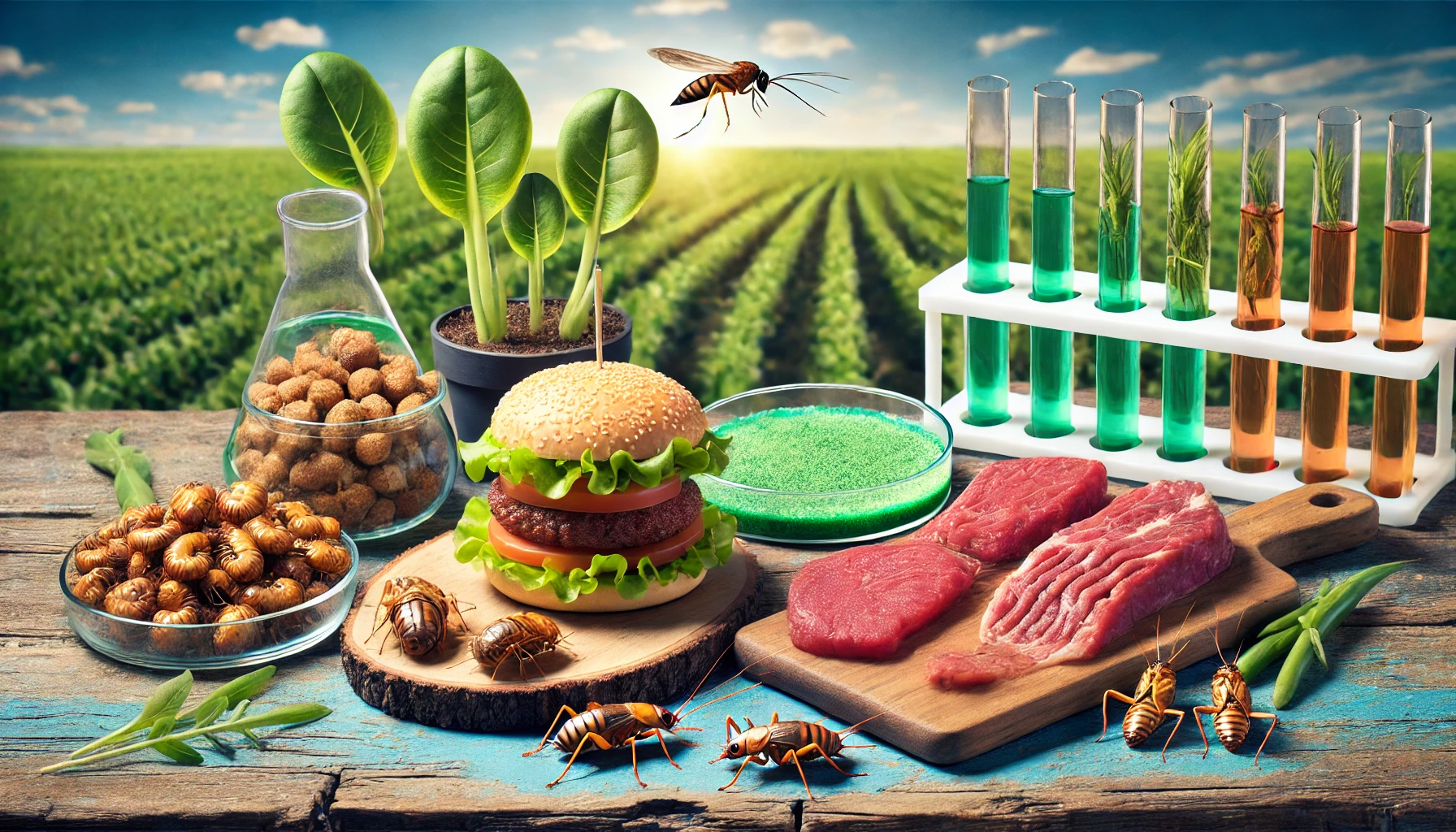As our global population continues to grow, the demand for food, particularly protein, is reaching unprecedented levels. Conventional livestock farming, while effective, poses significant environmental challenges, from greenhouse gas emissions to land degradation and water pollution. Enter sustainable protein production—an innovative approach that promises to revolutionize how we think about food and the environment. In this article, we’ll delve into the various eco-friendly solutions being developed and implemented to create a more sustainable future for protein production.
The Need for Sustainable Protein Production
Traditional livestock farming has long been the cornerstone of protein production, but it comes with a hefty environmental price. The agriculture sector is responsible for a significant portion of global greenhouse gas emissions, with livestock alone accounting for approximately 14.5% of these emissions. Beyond carbon footprints, livestock farming also demands vast amounts of water and land, contributing to deforestation and biodiversity loss.
To mitigate these impacts, sustainable protein production focuses on reducing the environmental footprint while meeting the dietary needs of a growing population. This involves innovative methods and technologies that range from plant-based proteins to lab-grown meat and insect farming.
Plant-Based Proteins: A Growing Trend
One of the most prominent solutions in sustainable protein production is the rise of plant-based proteins. Products like tofu, tempeh, and seitan have been around for centuries, but recent advancements have led to the creation of more palatable and versatile options, such as those from companies like Beyond Meat and Impossible Foods. These companies have developed plant-based burgers, sausages, and even chicken nuggets that closely mimic the taste and texture of their animal-based counterparts.
Benefits of Plant-Based Proteins
- Reduced Greenhouse Gas Emissions: Plant-based proteins produce significantly fewer greenhouse gases compared to livestock. For instance, producing one kilogram of beef generates approximately 27 kilograms of CO2-equivalent emissions, while plant-based proteins like lentils produce less than one kilogram.
- Lower Water Usage: Plant-based protein production requires far less water than raising livestock. Producing one kilogram of beef requires around 15,000 liters of water, whereas producing the same amount of lentils requires only about 1,250 liters.
- Decreased Land Use: Growing plants for direct human consumption is more land-efficient than growing crops to feed livestock. This efficiency reduces the need for deforestation and helps preserve natural habitats.
Lab-Grown Meat: The Future of Protein?
Lab-grown meat, also known as cultured or cell-based meat, is another groundbreaking innovation in sustainable protein production. This technology involves growing animal cells in a controlled environment to produce meat without the need for raising and slaughtering animals. Companies like Memphis Meats and Mosa Meat are at the forefront of this movement, working to bring lab-grown meat to market.
Advantages of Lab-Grown Meat
- Environmental Impact: Lab-grown meat has the potential to drastically reduce greenhouse gas emissions, land use, and water consumption compared to traditional livestock farming.
- Animal Welfare: By producing meat without the need for animal slaughter, lab-grown meat addresses ethical concerns related to animal welfare.
- Resource Efficiency: Cultured meat production can be more efficient in terms of feed-to-meat conversion rates, requiring fewer inputs to produce the same amount of protein.
Insect Farming: An Overlooked Solution
Insect farming, though less mainstream, offers a highly sustainable solution for protein production. Insects such as crickets, mealworms, and black soldier fly larvae are rich in protein and require minimal resources to farm. They can be fed on organic waste, reducing the need for traditional animal feed and contributing to a circular economy.
Benefits of Insect Farming
- High Feed Conversion Efficiency: Insects convert feed into protein more efficiently than livestock, with some species requiring up to ten times less feed.
- Low Greenhouse Gas Emissions: Insect farming generates far fewer greenhouse gases compared to livestock farming.
- Minimal Land and Water Use: Insects require significantly less land and water to produce the same amount of protein as traditional livestock.
Integrating Sustainable Protein Solutions
To achieve widespread adoption, sustainable protein production methods must be integrated into our existing food systems. This involves overcoming several challenges, including consumer acceptance, regulatory approval, and scaling production.
Consumer Acceptance
Educating consumers about the benefits of sustainable proteins is crucial. Many people are still hesitant to try plant-based or lab-grown meats, often due to unfamiliarity or skepticism about taste and nutritional value. However, as these products continue to improve and gain visibility, consumer acceptance is likely to grow.
Regulatory Approval
Ensuring that new protein sources meet safety and regulatory standards is essential for their widespread adoption. Governments and regulatory bodies must establish clear guidelines and frameworks to support the development and commercialization of sustainable protein products.
Scaling Production
Scaling up the production of sustainable proteins to meet global demand is a significant challenge. This requires investment in research and development, as well as infrastructure to support large-scale production and distribution.
The Role of Technology and Innovation
Advances in technology and innovation are driving the sustainable protein revolution. From precision fermentation to vertical farming, new methods are continually being developed to enhance the efficiency and sustainability of protein production.
Precision Fermentation
Precision fermentation involves using microorganisms to produce specific proteins and other valuable compounds. This technology can create high-quality proteins with a lower environmental impact, and it’s being utilized to develop everything from dairy alternatives to egg substitutes.
Vertical Farming
Vertical farming, which involves growing crops in stacked layers, offers a way to produce plant-based proteins more efficiently. By optimizing space and resources, vertical farming can reduce the environmental footprint of crop production and support sustainable food systems.
The Future of Sustainable Protein Production
The future of sustainable protein production looks promising, with numerous innovative solutions on the horizon. By embracing plant-based proteins, lab-grown meat, and insect farming, we can create a more sustainable and resilient food system. However, achieving this vision requires collaboration between scientists, policymakers, industry leaders, and consumers.
Conclusion: A Path Forward
Sustainable protein production is not just a trend but a necessity for our planet’s future. By adopting eco-friendly solutions and investing in innovative technologies, we can meet the growing demand for protein while minimizing our environmental impact. As we move forward, it’s essential to continue exploring and supporting diverse approaches to sustainable protein production, ensuring a healthier and more sustainable world for generations to come.
Sustainable protein production is revolutionizing the food industry by offering eco-friendly solutions that address environmental concerns associated with traditional livestock farming. From plant-based proteins and lab-grown meat to insect farming, these innovative methods provide viable alternatives to conventional protein sources. By reducing greenhouse gas emissions, conserving water, and minimizing land use, sustainable protein production is paving the way for a more sustainable and resilient food system. As consumer acceptance grows and regulatory frameworks evolve, these sustainable protein solutions will play a crucial role in feeding our growing population while protecting the planet. Embracing these advancements is essential for a healthier and more sustainable future.

